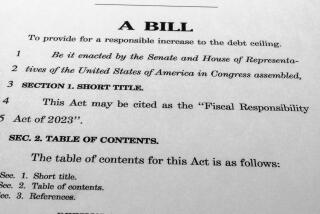The House : Tax Bill
- Share via
By a vote of 258 to 168, the House adopted a rule for debating legislation to give the U.S. Tax Code its first housecleaning in nearly four decades. Coming soon after the House had bottled up tax reform by rejecting essentially the same rule, this vote was a major breakthrough for President Reagan, Democrats who run the Ways and Means Committee and others who wanted the House to pass the tax bill.
The bill (HR 3838), which shifts a tax burden of about $140 billion from individuals to corporations, later was sent to the Senate on a non-record vote.
It lowers tax rates and reduces the number of brackets for individuals and businesses, closes or tightens a host of loopholes that companies and wealthy individuals have used to avoid taxation, drops about 6 million poor people from the tax rolls and makes dozens of other major changes on behalf of a more fair and simple tax code.
House Speaker Thomas P. O’Neill (D-Mass.), who supported the measure, said a vote for the rule was “a vote for the working people of America over the special interests . . . for the individual taxpayer over the well-financed corporations.”
Opponent Buddy Roemer (D-La.), who objected to the bill’s higher taxation of the timber and oil and gas industries, said the rule “reminds me of a Louisiana bullfrog--all mouth and no guts. This rule does not allow us to touch the guts of the bill.”
Most members voting yes favored the tax overhaul bill as well as the rule for debating it.
How They Voted Yea Nay No vote Rep. Moorhead (R) x Rep. Roybal (D) x Rep. Waxman (D) x
Campaign Contributions
An amendment to the tax bill (above) to permit a tax credit of up to $100 for a contribution to a House or Senate candidate was adopted by the House on a vote of 230 to 196. On joint returns, the maximum credit would be $200. Because tax credits enable individuals to lower their taxes by the full amount of the credit, this was seen as a form of public financing of campaigns.
The amendment was drafted by House Democrats, who touted it as a way for small contributors to offset the influence of political action committee money in House and Senate races. But many Democrats voted against it and many Republicans supported it.
Democratic opposition and GOP support was based mainly on a suspicion that members of single-issue pressure groups, which tend to favor Republican candidates, would use the tax credit much more than would union members, minorities and other small donors in Democratic ranks.
Members voting yes favored the tax credit for small congressional campaign contributions.
How They Voted Yea Nay No vote Rep. Moorhead (R) x Rep. Roybal (D) x Rep. Waxman (D) x
More to Read
Get the L.A. Times Politics newsletter
Deeply reported insights into legislation, politics and policy from Sacramento, Washington and beyond. In your inbox three times per week.
You may occasionally receive promotional content from the Los Angeles Times.










